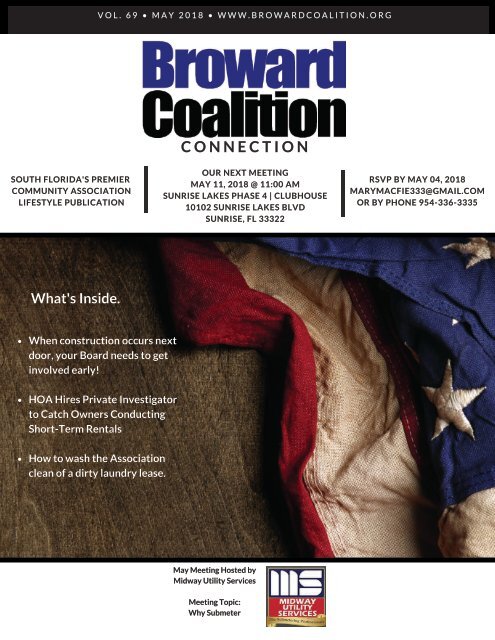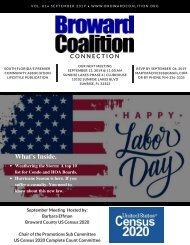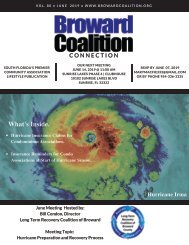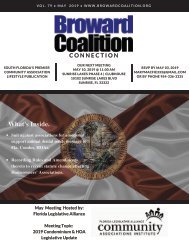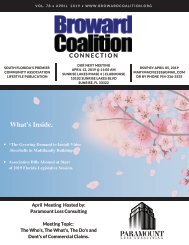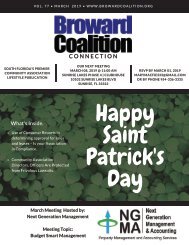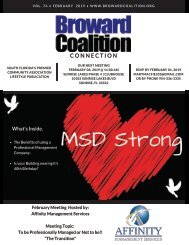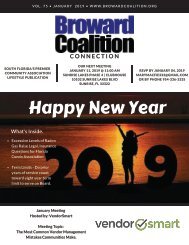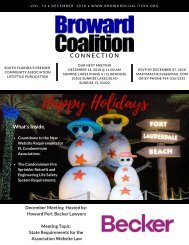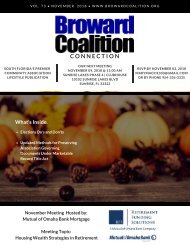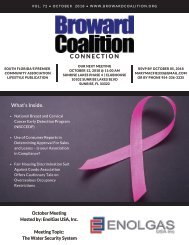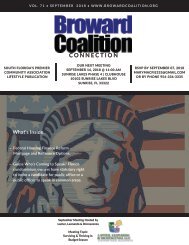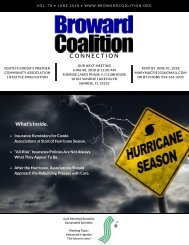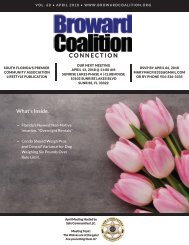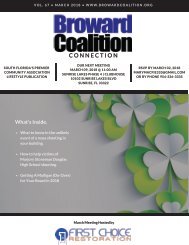May 2018 Newsletter
Create successful ePaper yourself
Turn your PDF publications into a flip-book with our unique Google optimized e-Paper software.
V O L . 6 9 • M A Y 2 0 1 8 • W W W . B R O W A R D C O A L I T I O N . O R G<br />
V O L . 6 9 • M A Y 2 0 1 8 • W W W . B R O W A R D C O A L I T I O N . O R G<br />
OUTH FLORIDA'S PREMIER<br />
COMMUNITY SOUTH FLORIDA'S ASSOCIATION<br />
PREMIER<br />
LIFESTYLE COMMUNITY PUBLICATION<br />
ASSOCIATION<br />
LIFESTYLE SOUTH FLORIDA'S PUBLICATION PREMIER<br />
COMMUNITY ASSOCIATION<br />
LIFESTYLE PUBLICATION<br />
C O N N E C T I O N<br />
C O N N E C T I O N<br />
OUR NEXT MEETING<br />
MAY 11, <strong>2018</strong> @ 11:00 AM<br />
C OUR NNEXT N EMEETING<br />
C I O N<br />
SUNRISE MAY LAKES 11, <strong>2018</strong> PHASE @ 11:00 4 | CLUBHOUSE<br />
AM<br />
SUNRISE 10102 LAKES OUR SUNRISE NEXT PHASE MEETING LAKES 4 | CLUBHOUSE<br />
BLVD<br />
10102 MAY SUNRISE, 11, <strong>2018</strong> FL LAKES @ 11:00 33322 BLVD AM<br />
SUNRISE SUNRISE, LAKES PHASE FL 33322 4 | CLUBHOUSE<br />
10102 SUNRISE LAKES BLVD<br />
SUNRISE, FL 33322<br />
RSVP BY MAY 04, <strong>2018</strong><br />
MARYMACFIE333@GMAIL.CO<br />
RSVP BY MAY 04, <strong>2018</strong><br />
MARYMACFIE333@GMAIL.COM<br />
OR BY PHONE 954-336-3335<br />
OR RSVP BY PHONE BY MAY 954-336-3335<br />
04, <strong>2018</strong><br />
MARYMACFIE333@GMAIL.COM<br />
OR BY PHONE 954-336-3335<br />
What's Inside.<br />
What's Inside.<br />
What's Inside.<br />
When construction occurs next<br />
When construction occurs next<br />
door,<br />
door, When your<br />
your<br />
Board construction Board<br />
needs<br />
needs occurs to<br />
to<br />
get<br />
get next<br />
involved involved<br />
door, early! your<br />
early!<br />
Board needs to get<br />
involved early!<br />
HOA HOA Hires Hires Private Investigator<br />
HOA Hires Private Investigator<br />
to to Catch Owners Conducting<br />
to Catch Owners Conducting<br />
Short-Term Short-Term<br />
Rentals<br />
Rentals<br />
How How to How to wash to wash the the Association<br />
clean clean clean of of a a of dirty a dirty laundry laundry lease. lease.<br />
<strong>May</strong> Meeting Hosted by<br />
<strong>May</strong> Meeting Hosted by<br />
<strong>May</strong> Midway Meeting Utility Hosted Services<br />
Midway Utility Services<br />
by<br />
Midway Utility Services<br />
Meeting Topic:<br />
Meeting Why Submeter Topic:<br />
Meeting Why Submeter Topic: 1<br />
Why Submeter
We believe you will benefit<br />
from a FREE subscription to<br />
THE COOPERATOR SOUTH FLORIDA.<br />
Why you?<br />
As a board member or manager, you need a dependable,<br />
credible source of information about the issues that<br />
impact your condo, HOA or co-op community.<br />
Unlike other periodicals that try to be a little something<br />
for everyone, The Cooperator South Florida is a whole<br />
lot of exactly what YOU need to steer your condo, HOA<br />
or co-op community toward success.<br />
So how will YOU benefit from a FREE subscription to<br />
The Cooperator South Forida? For starters:<br />
FREE<br />
SUBSCRIPTION<br />
OFFER<br />
* You’ll get insights from fellow managers and<br />
community leaders on everything from landscaping<br />
to conflict resolution.<br />
* You’ll stay informed of important legal and<br />
legislative issues, industry news, innovations, and<br />
technology.<br />
Subscribe online now for your free subscription<br />
at soflcooperator.com/subscribe<br />
2
3
HOW TO WASH<br />
THE ASSOCIATION<br />
CLEAN OF A<br />
DIRTY<br />
LAUNDRY<br />
LEASE<br />
The termination and transitioning<br />
from one laundry vending company to<br />
another can be a dirty job. Rarely do companies<br />
fight as hard as laundry vending<br />
machine companies. While community<br />
associations should always ensure<br />
that their laundry lease with a laundry<br />
vending company includes clear termination provisions and specific<br />
obligations of the parties upon termination, the scenario as<br />
occurred in the case of CSC Service Works, Inc. v. Boca Bayou<br />
Condominium Association, Inc. and Commercial Laundries, Inc.,<br />
recently decided by Florida’s Fourth District Court of Appeal in its<br />
March 7, <strong>2018</strong> published opinion, could happen to any association.<br />
The lessons learned from this case are equally relevant to many other<br />
contract situations, too.<br />
In this case, Boca Bayou Condominium Association, Inc.<br />
(“Association”) had a laundry lease with the laundry vending<br />
company, CSC Service Works, Inc. (“CSC”). Pursuant to the laundry<br />
lease, CSC was to install commercial washers and dryers in the<br />
Association’s 26 laundry rooms and maintain them for an initial<br />
term of seven years. The laundry lease also contained a seriously<br />
noxious and repugnant “right of first refusal” provision which<br />
gave CSC the option to again lease the Association’s laundry<br />
rooms before the Association is allowed to enter into a lease with a<br />
different laundry vending company.<br />
Upon the expiration of the initial seven-year term, the<br />
Association and CSC extended the laundry lease for an additional<br />
seven years. After the expiration of the extended seven-year term,<br />
CSC continued to lease the Association’s laundry rooms and have<br />
its washers and dryers in the Association’s laundry rooms on a<br />
month-to-month basis for almost two years. Around that time, the<br />
Association began receiving complaints from the residents.<br />
Spurred by the resident’s complaints, the Association sought<br />
lease offers from several laundry vending companies, including<br />
CSC and Commercial Laundries, Inc. The Association decided<br />
to go with Commercial Laundries. As such, the Association then<br />
sent CSC a letter terminating its laundry lease and inquiring as to<br />
when CSC would come to disconnect and remove its washers and<br />
dryers from the Association’s laundry rooms.<br />
Just over a week prior to Commercial Laundries’ scheduled<br />
delivery and installation of its washers and dryers, CSC informed<br />
the Association and Commercial Laundries that it was exercising<br />
its right of first refusal. However, CSC’s right of first refusal was<br />
denied by the Association.<br />
After several attempts by both the Association and Commercial<br />
Laundries to have CSC remove its washers and dryers, CSC failed<br />
to remove its washers and dryers in time for Commercial Laundries<br />
to install its washers and dryers. As a result, when Commercial<br />
Laundries arrived at the Association’s condominium with its<br />
washers and dryers in tow, Commercial Laundries disconnected<br />
CSC’s washers and dryers from the water and electric hook-ups<br />
and moved them to the side of the laundry rooms for CSC’s removal.<br />
None of CSC’s washers and dryers were damaged in the<br />
process or removed from the Association’s laundry rooms. Also,<br />
CSC was welcome to go to the Association’s laundry rooms,<br />
which remained unlocked, to remove their washers and dryers at<br />
any time.<br />
by Jeffrey A. Rembaum<br />
Kaye Bender Rembaum. Attorney’s at Law<br />
Due to CSC’s continued failure to<br />
remove its washers and dryers, the Association<br />
sent CSC a pre-suit demand letter<br />
providing that if CSC did not remove its<br />
washers and dryers within 15 days, the<br />
Association, as landlord, would evict<br />
CSC from the Association’s laundry<br />
rooms. Although CSC ultimately removed its washers and dryers<br />
in compliance with the Association’s letter, it was merely the beginning<br />
of its aggressive fight which resulted in a lawsuit being<br />
filed by CSC against the Association and Commercial Laundries<br />
for breach of the laundry lease, tortious interference, conversion,<br />
and unlawful detainer, which was the subject of this case.<br />
At trial, CSC argued that disconnecting its washers and dryers<br />
without legal process or CSC’s knowledge or consent was tantamount<br />
to being ousted from the Association’s laundry rooms. In<br />
the end, the case was decided by a jury. Yes, that’s right, CSC’s<br />
dispute went to the jury. As an aside, think of the tens of thousands<br />
of dollars expended in legal fees and costs just to get to that<br />
point. The jury ultimately decided in favor of the Association<br />
and Commercial Laundries. Then CSC appealed and lost. Thus<br />
the trial court’s jury decision was upheld by Florida’s Fourth<br />
District Court of Appeal.<br />
On appeal, CSC again argued that disconnecting its washers<br />
and dryers without legal process or CSC’s knowledge or consent<br />
was tantamount to an “ouster” from the Association’s laundry<br />
rooms and wrongful repossession of the laundry rooms by the<br />
Association. In legal terms, that is referred to as “unlawful detainer.”<br />
In defense, the Association argued that the disconnecting was not<br />
ouster and repossession because CSC’s washers and dryers were<br />
never removed from the laundry rooms.<br />
The Court provided that there are three factors in an unlawful<br />
detainer action: (1) the plaintiff (CSC) was in peaceful possession of<br />
the premises (the laundry rooms); (2) the plaintiff (CSC) was ousted<br />
of actual possession of the premises (the laundry rooms); and (3) the<br />
defendant (the Association and Commercial Laundries) withheld<br />
possession of the premises (the laundry rooms) from the plaintiff<br />
(CSC) without consent or legal process.<br />
Because CSC’s washers and dryers were never removed from<br />
the laundry rooms, the Court held that the action of disconnecting<br />
CSC’s washers and dryers and moving them to the side of<br />
the laundry rooms did not amount to ouster of CSC from its actual<br />
possession of the laundry rooms as required by an action for<br />
unlawful detainer. While the disconnecting and relocation of the<br />
washers and dryers may be a form of what the Court refers to as<br />
“constructive or useful dispossession,” unlawful detainer actions<br />
require actual dispossession, which did not occur in this case.<br />
Laundry leases, while often quite short, are also often written in<br />
tiny print whose terms can even give an experienced lawyer a run<br />
for the money as to the lease’s long-term implications. The laundry<br />
lease makes up for its brevity with obnoxious long-term effects<br />
and difficult concepts for a layman to understand. With that in<br />
mind, this case demonstrates the need for the association’s lawyer<br />
to review all of the association’s contracts. Just because the lease<br />
is two pages long, this does not mean its financial implications are<br />
not extremely far reaching.<br />
In any event, it is great to the see an association prevail<br />
against the laundry machine vendor!<br />
4
HOA Hires Private Investigator to Catch Owners<br />
Conducting Short-Term Rentals<br />
by Roberto C. Blanch<br />
SRHL Law<br />
Condominium associations and HOAs<br />
throughout South Florida as well as across the<br />
country are seeking effective responses to the<br />
problem of short-term rentals that are in violation<br />
of their rules and restrictions. These unauthorized<br />
rentals, which have become prevalent with<br />
the growth of Airbnb and other online homesharing<br />
platforms, are creating significant<br />
security and liability concerns for associations.<br />
One response by a San Diego homeowners<br />
association recently drew the attention of its<br />
local ABC affiliate, which chronicled how the<br />
community had retained a private investigator<br />
to gather and document incontrovertible<br />
proof that specific owners were conducting<br />
the restricted rentals. The licensed private<br />
detective and his associates were hired by<br />
the HOA and other local associations to investigate<br />
homeowners and tenants who are<br />
violating association bylaws and CC&Rs that<br />
prohibit turning units into short-term vacation<br />
rentals.<br />
While the hiring of private detectives may<br />
initially seem as an extreme measure for an<br />
association, it makes sense when one considers<br />
the risks and concerns that are brought on by<br />
5<br />
these rentals for HOAs and condominiums.<br />
Also, court actions may become necessary<br />
against some unit owners who flout the rules,<br />
and the evidence obtained by these investigators<br />
as well as their testimony can be very<br />
helpful in these proceedings.<br />
In order to get away with these rentals, savvy<br />
owners have been known to sneak their<br />
transient guests into the property by advising<br />
security that their visit is authorized. As such,<br />
enhanced vigilance and guest-screening<br />
measures have become necessary, and<br />
many associations are now developing and<br />
implementing new registration forms for use<br />
with guests and tenants along with written<br />
assurances and non-compensation statements<br />
indicating that they are not paying<br />
for their stays.<br />
In addition to the use of private detectives,<br />
the implementation of a clear fining or suspension<br />
policy, if permitted, is essential for<br />
associations to address unauthorized shortterm<br />
rentals. This will typically entail the adoption<br />
of a new rule in which all of the fines and<br />
other consequences are delineated.<br />
Community associations are also responding<br />
by adopting new amendments, bylaws or<br />
rules to limit the number of nights a residence<br />
may be rented, which can offer a level of<br />
flexibility for owners while also avoiding the<br />
possibility of creating a revolving door of<br />
unfettered short-term guests.<br />
As the concerns created by the growth of<br />
short-term rentals continue to mount for community<br />
associations across the country, appropriate<br />
and effective responses such as these<br />
will help ameliorate the problem.
6<br />
561-693-3160<br />
www.citiquiethurricanewindows.com
When construction occurs next door,<br />
your Board needs to get involved early!<br />
By Donna DiMaggio Berger<br />
Becker Lawyers<br />
It’s likely that at some point during your community’s<br />
lifespan, new construction will occur nearby and the<br />
impact on your residents will vary both short and<br />
long-term depending on the steps your Board takes<br />
early in the process. Sometimes new construction<br />
is welcomed enthusiastically by the members of an<br />
established community but more often than not,<br />
nearby construction strikes dread in the hearts and<br />
minds of many residents and board members who<br />
fear noise, disruption, debris, impaired views and incidental<br />
damage.<br />
Communities facing the prospect of new construction<br />
next door should not go “on the attack” but should<br />
engage experienced counsel to help them navigate<br />
the construction process, set realistic expectations<br />
for their residents, reach agreement on protective<br />
measures to be provided by the contractor/developer,<br />
and receive compensation where appropriate. If<br />
handled properly, the new construction can do much<br />
to enhance your community’s value. If mishandled,<br />
you could wind up with new construction that encroaches<br />
on your land, damages your landscaping<br />
and exterior amenities, adversely impacts drainage,<br />
and, in severe cases, causes structural cracks in<br />
your buildings.<br />
Naturally, the individuals or corporate entity driving<br />
the new construction want your community’s support<br />
to sail through the governmental approval process.<br />
Boards who feel that their concerns and issues have<br />
been properly addressed by the developer next door<br />
will be much more likely to provide that support.<br />
There are many factors to discuss and consider with<br />
the developer including the intensity of the proposed<br />
use, traffic, compatibility issues, construction management,<br />
easement agreements, rezoning, and other<br />
material issues. Municipal Land Developer Codes<br />
usually require public participation so starting a dialogue<br />
early in the process affords your Board with<br />
an opportunity for your community and the developer<br />
to speak with a unified voice and to address major<br />
issues and concerns before being heard in a public<br />
hearing. The developer will certainly want to address<br />
your concerns in private rather than face them at a<br />
public hearing.<br />
7<br />
Some common issues that should be addressed<br />
include:<br />
· Debris<br />
· Nuisance<br />
· Structural impact<br />
· Encroachments (both on their side and yours)<br />
· View Impairment<br />
· Buffering and noise mitigation measures<br />
· Trademark Infringement (depending on the name<br />
of the new community, shopping center, etc.)<br />
· Security<br />
These kinds of negotiations may take six months to<br />
well over a year and will include your counsel attending<br />
and speaking at multiple Board meetings, Developer<br />
Town Halls, Municipal Public Hearings, researching<br />
City Zoning and Land Use, reviewing Mas6ter Plan<br />
Design guidelines, clarifying construction issues/<br />
timelines and negotiating the design to take into account<br />
view-lines, setbacks, traffic, loading, etc.<br />
If you serve on an association board, you well know<br />
that directors are sometimes held responsible by<br />
some community members for issues completely<br />
outside your control. Don’t let neighboring construction<br />
become another boiling point in your community.<br />
If you currently have construction proposed or underway<br />
near your community and you wish to learn<br />
how to best protect your community’s rights, please<br />
email me at dberger@beckerlawyers.com or call<br />
954-364-6031.
8
9
t<br />
JUDY SCOTT<br />
&<br />
GARY CLARK<br />
<strong>May</strong> 5, <strong>2018</strong><br />
8:00 PM<br />
BIANA PINCHUCK<br />
&<br />
MITCH DAVIE<br />
<strong>May</strong> 19, <strong>2018</strong><br />
8:00 PM<br />
t<br />
Call: 954-748-3230 Ext. 1<br />
Box Office Hours: Mon-Fri. 9:00am - 2:00pm<br />
Wednesday Hours: 9:00am - 8:00pm<br />
For More information<br />
emai: marian@sunriselakesphase 4.org<br />
Get Your Tickets Today!<br />
Low Price $8.00 - Including Coffee & Cake<br />
10<br />
The Theater at<br />
Sunrise Lakes 4<br />
10102 Sunrise Lakes Blvd.<br />
Sunrise, Florida 33322
Representation<br />
you can trust.<br />
Legal Counsel to Community Associations Since 1977<br />
Offices in Miami-Dade, Broward and Palm Beach<br />
Main Office: Suntrust Plaza, 201 Alhambra Circle, Suite 1100, Coral Gables, FL 33134<br />
800-737-1390 | www.srhl-law.com<br />
11
PRESRT STD<br />
US Postage<br />
PAID<br />
Ft. Lauderdale FL<br />
Permit # 2505<br />
PO Box 452874<br />
Fort Lauderdale, FL<br />
33345-2874<br />
KayeBenderRembaum-BC-MAY18.qxp_Layout 1 3/22/18 10:22 AM Page 1<br />
Dedicated to the Representation of Community Associations<br />
Free Certification Courses and Seminars for<br />
Community Association Board Members and Licensed CAMs<br />
BROWARD COUNTY<br />
1200 Park Central Blvd. South, Pompano Beach<br />
RSVP required: seminars@KBRLegal.com or 954.928.0680<br />
Condominium and Cooperative Association<br />
Board Member Certification Course<br />
Provider #: 0005092 • Condo Course #: 9626451 • Co-op Course #: 9627380<br />
Tuesday, <strong>May</strong> 8 • 6:30 to 8:30 p.m.<br />
Two IFM or ELE Credits are provided.<br />
Homeowner Association<br />
Board Member Certification Course<br />
Provider #: 0005092 • Course #: 9627379<br />
Tuesday, <strong>May</strong> 22 • 6:30 to 8:30 p.m.<br />
Two IFM or ELE Credits are provided.<br />
PALM BEACH COUNTY<br />
9121 North Military Trail, Suite 200, Palm Beach Gardens<br />
RSVP required: trisha@KBRLegal.com or 561.241.4462<br />
Homeowner Association<br />
Board Member Certification Course<br />
Provider #: 0005092 • Course #: 9627379<br />
Wednesday, <strong>May</strong> 9 • 6:00 to 8:30 p.m.<br />
Two IFM or ELE Credits are provided.<br />
Condominium Association<br />
Board Member Certification Course<br />
Provider #: 0005092 • Course #: 9626451<br />
Wednesday, <strong>May</strong> 16 • 6:00 to 8:30 p.m.<br />
Two IFM or ELE Credits are provided.<br />
“Ask the Experts” on WWNN 1470AM and 93.5FM<br />
Join Robert Kaye and Michael Bender on the first Thursday of each month from 5 to 6 p.m.<br />
Call in with your pressing association law questions to 888.565.1470.<br />
Also available on KBRLegal.com, iHeart Radio, YouTube and U Stream.<br />
Broward Office: 1200 Park Central Boulevard South | Pompano Beach, FL 33064 | 954.928.0680<br />
Palm Beach Office: 9121 North Military Trail, Suite 200 | Palm Beach Gardens, FL 33410 | 561.241.4462<br />
Info@KBRLegal.com KBRLegal.com<br />
The hiring of a lawyer is an important decision that should not be based solely upon advertisements. Before you decide, ask us to send you free written information about our qualifications and experience.<br />
12


